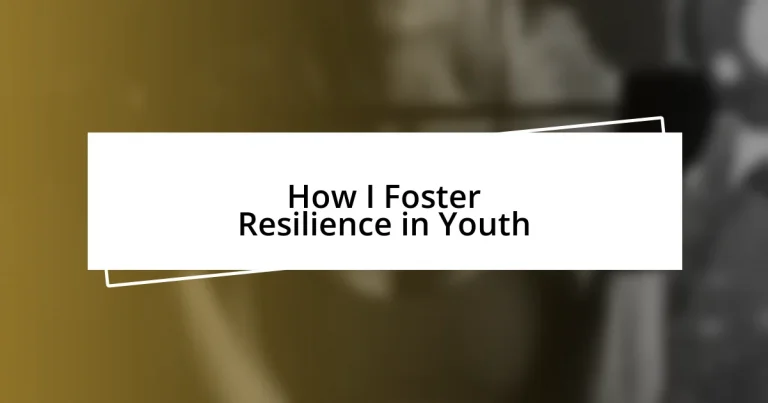Key takeaways:
- Supportive relationships and mentorship foster youth resilience by creating a sense of belonging and trust.
- Empowering youth through decision-making and reframing challenges as growth opportunities enhances their confidence and critical thinking skills.
- Teaching personalized coping strategies and creating a supportive community encourages open communication, collaboration, and a sense of safety for youth to express themselves.
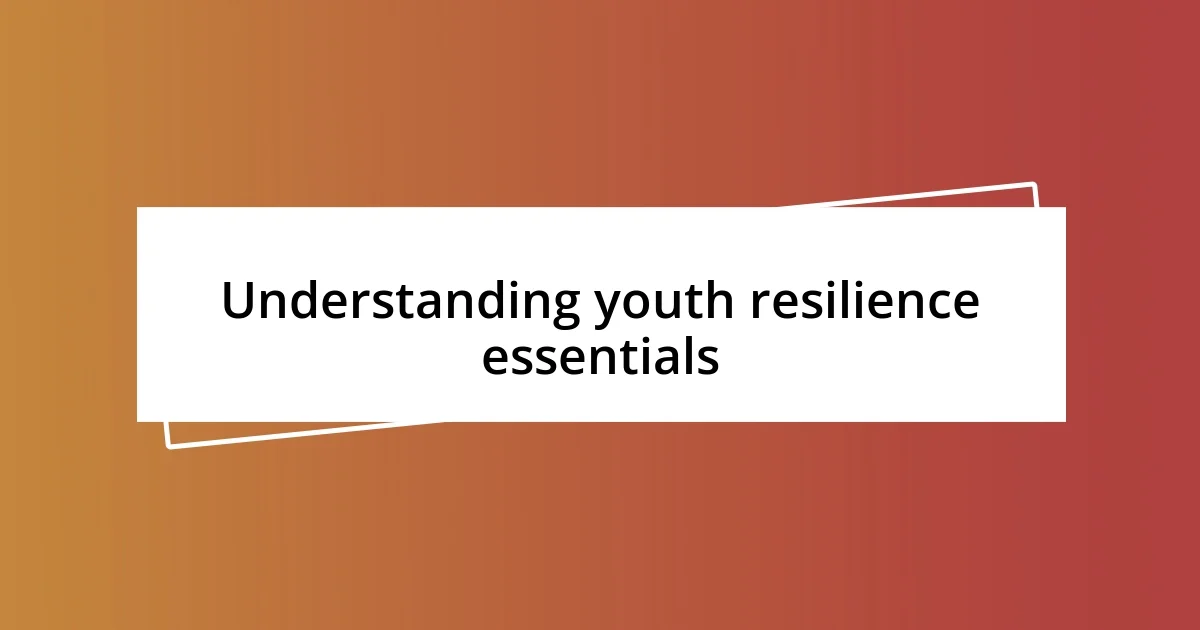
Understanding youth resilience essentials
Youth resilience is built on a foundation of supportive relationships, whether it’s with family, friends, or mentors. I’ve witnessed firsthand how a simple word of encouragement can alter a young person’s trajectory. Have you ever noticed how a dependable adult presence can help a youth navigate life’s challenges? It’s remarkable how connection fosters a sense of belonging, allowing them to bounce back when faced with adversity.
Another essential aspect is fostering a growth mindset. I remember a student who feared failure to the extent that it stunted her creativity. After we reframed challenges as opportunities to learn, she blossomed! Encouraging young people to view setbacks as stepping stones, rather than obstacles, can be a game changer. But how do we cultivate this mindset? It starts with small affirmations and guiding them to recognize their strengths.
Finally, teaching coping strategies is vital for building resilience. My experience has shown me the value of mindfulness practices, like deep breathing or journaling. I once encouraged a teenager to journal about his feelings during tough times; he discovered patterns and triggers that he hadn’t considered before. Aren’t these reflections powerful tools for self-discovery? Helping youth develop these skills equips them to face life’s storms with confidence and grace.
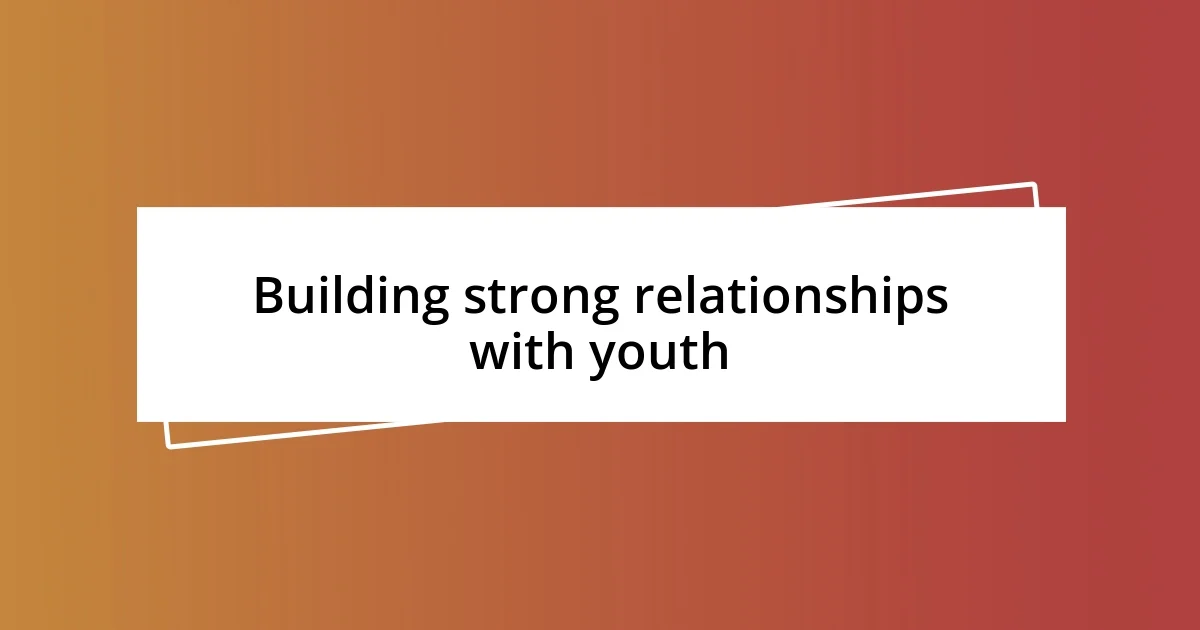
Building strong relationships with youth
Building strong relationships with youth is a vital component of fostering resilience. I remember a time when I took on a mentoring project in my community. One of the young people I worked with was struggling to trust adults, having been let down multiple times. We started meeting weekly, and through consistent communication and shared experiences, I saw her walls slowly come down. It’s incredible how a little time and attention can forge connections that empower young people to feel safe and valued.
Here are some key ways to strengthen relationships with youth:
- Create Consistent Touchpoints: Regular check-ins, even just casual chats, build trust over time.
- Be an Active Listener: Show genuine interest in their thoughts and feelings to make them feel heard.
- Share Personal Experiences: Relating your own challenges can create a bond and show them they’re not alone.
- Encourage Their Interests: Actively support their passions; it shows that you care about their individuality.
- Set Clear Boundaries: While being friendly, it’s essential to uphold respectful boundaries, ensuring a safe space.
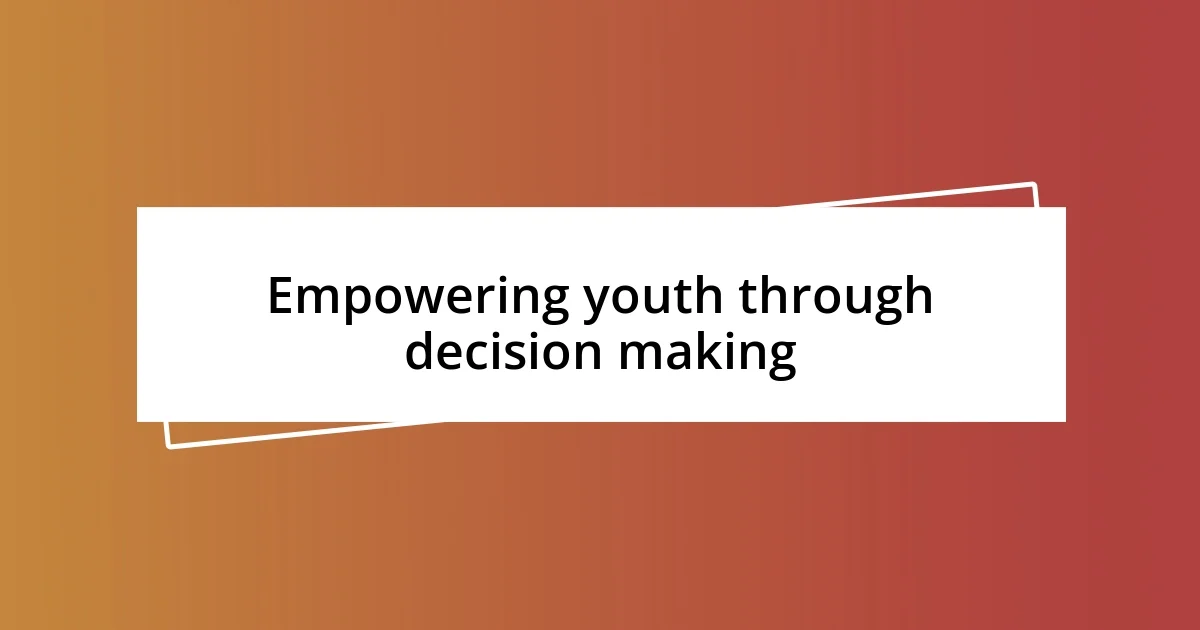
Empowering youth through decision making
Empowering youth through decision making is a transformative experience, both for them and for those of us who guide them. I recall working with a group of teens on a community project where they were tasked with deciding how to allocate a budget. They were nervous, but as they started discussing and debating options, I could see their confidence grow. It amazed me how taking charge of their decisions ignited a spark in them, fostering a sense of ownership that directly translated into empowerment.
When we empower youth to make decisions, we teach them valuable life skills. I once organized a workshop where the participants faced real-life scenarios and had to decide how to resolve conflicts. The conversations that unfolded were enlightening. They not only learned to weigh options and consider consequences but also started to appreciate diverse perspectives. This process helped me realize that decision-making isn’t just about the outcome; it’s about developing critical thinking skills and emotional intelligence.
Moreover, it’s essential to provide a supportive environment that encourages young people to express their thoughts freely. During a mentorship session, I encouraged a young man to voice his opinion on the direction of our program. Initially hesitant, he finally shared his ideas, which turned out to be brilliant! This moment reinforced my belief that when youth feel safe to make choices, they cultivate resilience by embracing their unique voices in the world. Helping them navigate this process can leave a lasting impact.
| Decision-Making Support | Outcome for Youth |
|---|---|
| Guided Discussions | Increased Confidence |
| Real-Life Scenarios | Enhanced Critical Thinking |
| Safe Expression of Ideas | Empowerment and Resilience |
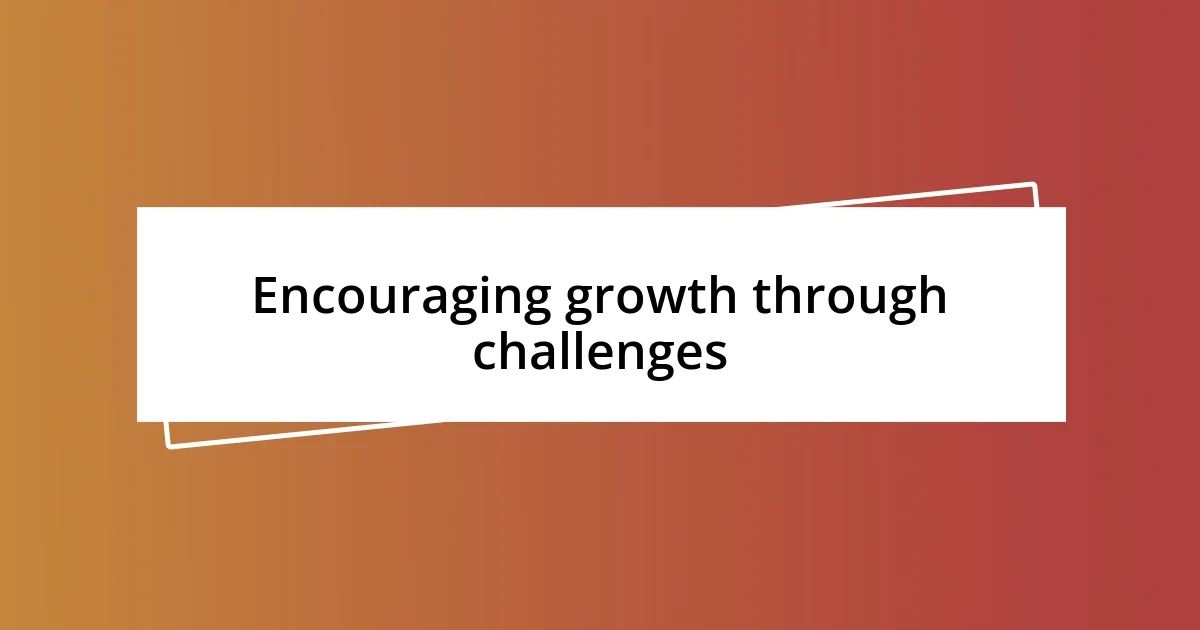
Encouraging growth through challenges
Challenges can be incredible teachers, and I believe that facing them head-on builds resilience. I recall a time when I encouraged a young woman I mentored to audition for a school play, even though she was terrified of performing in front of an audience. As we prepared together, she began to see the experience as a chance for growth rather than just a risk. When she stepped onto that stage, I could sense her fear turning into determination. Watching her transform was a powerful reminder that sometimes, taking that first step into discomfort can lead to profound personal development.
In my experience, it’s essential to frame challenges as opportunities for growth. I often ask young people, “What can you learn from this situation?” This simple question opens up a dialogue about resilience and the mindset needed to tackle difficulties. Recently, a student faced a significant setback in his sports team tryouts. Instead of allowing him to dwell on disappointment, I guided him to reflect on what he could improve for next time. His shift in perspective not only motivated him to train harder but also helped him understand that failures are merely stepping stones on the path to success.
Moreover, it’s important to celebrate even the smallest victories in this journey. I remember a young man who narrowly missed a scholarship opportunity. Instead of focusing solely on the loss, we recognized his efforts in applying and the growth he experienced throughout the process. “What if I told you that your resilience is already showing through this effort?” I asked him. Emphasizing progress over perfection fosters a mindset that welcomes challenges rather than shying away from them. It’s in these moments that youth learn to embrace adversity as a vital part of their personal development.
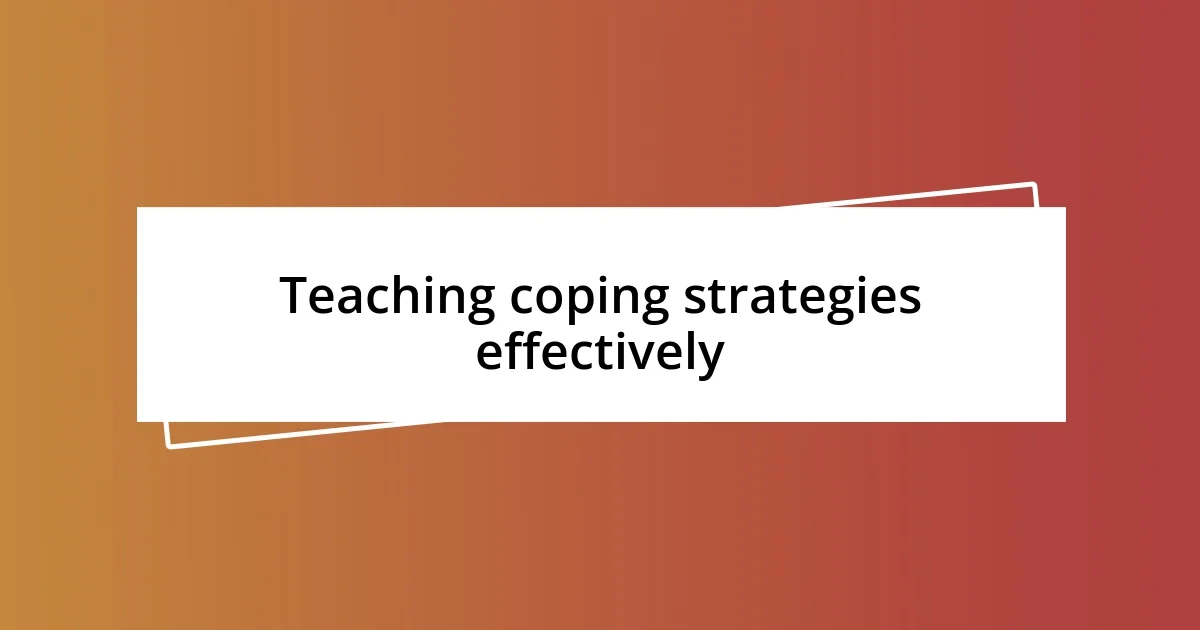
Teaching coping strategies effectively
Teaching effective coping strategies involves more than just sharing techniques—it’s about modeling resilience in action. I once led a group therapy session for young people facing anxiety. When one participant disclosed his struggles with test-taking, I didn’t just provide breathing exercises; I shared my own experiences with anxiety and how I navigated it. This vulnerability encouraged the group to open up, showcasing how personal stories can transform a simple strategy into a powerful tool for connection and understanding.
I also learned the importance of tailoring coping strategies to individual needs. For instance, during a particularly challenging period in my life, I found journaling to be an incredible outlet. So, I introduced it as a coping method to youth I was working with. Over time, many discovered that putting their thoughts on paper not only helped them process their emotions but also sparked creativity. I often ask, “What works best for you?” This question empowers them to find what resonates personally, making the strategies more impactful.
It’s crucial to keep the lines of communication open. In a recent program, I encouraged participants to share their coping strategies in small groups. One student shared how deep breathing helped her calm her racing thoughts during exams. I realized that these exchanges foster community and support, creating an environment where youth can learn from each other. Engaging in these conversations not only builds empathy but also teaches the invaluable lesson that asking for help is a strength, not a weakness.
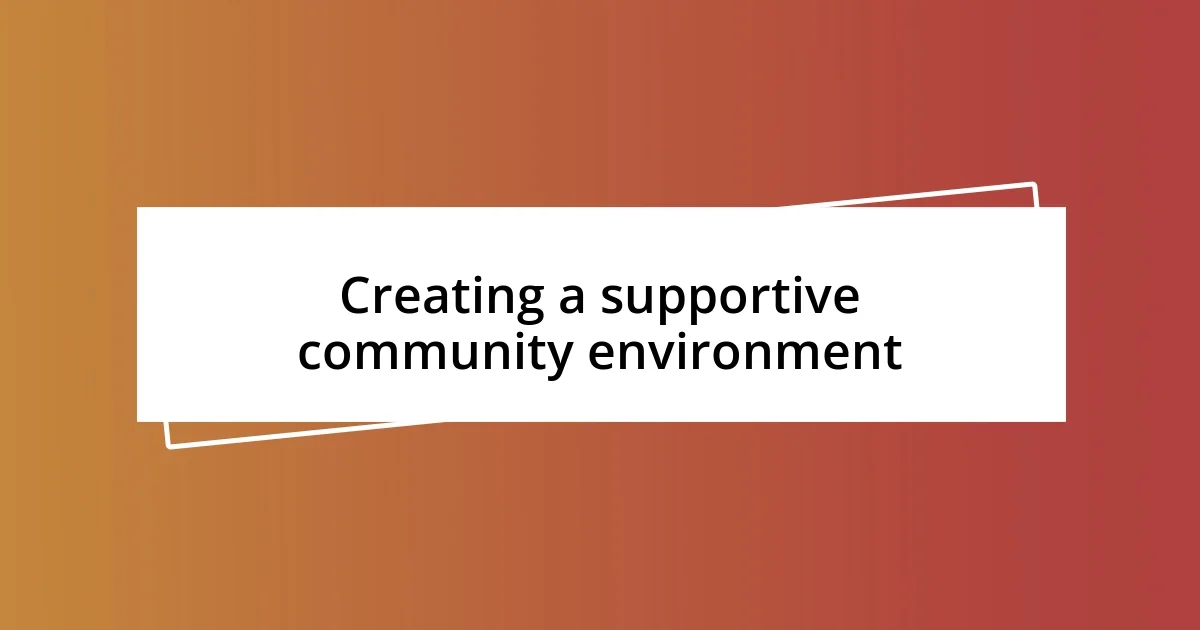
Creating a supportive community environment
Creating a supportive community environment is essential for fostering resilience in youth. I remember being part of a local mentorship program, where we organized regular community events like picnics and talent shows. These gatherings allowed young people to connect with each other and share their experiences in a relaxed atmosphere. I often reflect on the joy I saw in their eyes as they cheered for one another; it was a vivid reminder that a sense of belonging can make all the difference when facing life’s challenges.
Moreover, I make it a point to encourage collaboration among families, schools, and local organizations. I once partnered with a nearby school to host workshops on resilience-building activities. As parents and children engaged in problem-solving games together, I could see the trust and understanding growing between them. This partnership not only strengthened community ties but also showed the youth that they are supported from multiple angles; they aren’t alone in facing their struggles.
It’s fascinating to observe how a single supportive interaction can change a young person’s outlook. During a neighborhood clean-up day, I noticed a shy girl step forward to share her excitement about environmental issues. Her passion sparked conversations, and soon others joined in, creating a buzz of collective enthusiasm. Reflecting on this experience, I often ask myself, “How can moments like these be amplified to inspire even greater resilience?” Building that supportive environment is about promoting those small connections that empower youth to speak up and embrace their individuality.












